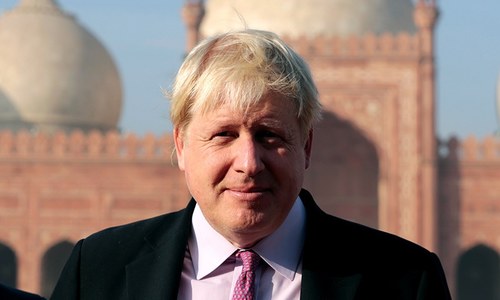
ISLAMABAD: The United Kingdom is looking to put new dynamism into its longstanding relations with Pakistan by bolstering trade, economic, security and cultural cooperation as it seeks to re-establish itself at the global stage ahead of exiting European Union (EU).
British Foreign Secretary Boris Johnson was here earlier this week to lay the groundwork for rebooting of the relationship.
In an interview with Dawn, Mr Johnson said UK wanted to forge a new relationship with Pakistan.
“The message we want to get over is that UK is here for Pakistan, we are supportive of Pakistan, we understand many of the issues Pakistan faces and we are here to be useful and at the same time build bilateral economic relationship,” the British foreign secretary, who was on his first visit to Pakistan after assuming the office, said after his meetings with Prime Minister Nawaz Sharif and Adviser on Foreign Affairs Sartaj Aziz, which he described as “extremely friendly and supportive”.
Ever since the Brexit vote, the new UK government has been working to re-calibrate its foreign policy and placing a special emphasis on its old relationships in the region. Explaining the post-Brexit vote policy, Mr Johnson said UK “wants to be more outward looking, more energetic, and more engaged with the world”.
Emphasising the special position Pakistan enjoys in UK’s foreign policy calculus, the secretary, whose wife is of Pakistani heritage, said “the two per cent of our population that can trace its origin to this land creates an indissoluble bond”, which needed to be strengthened.
Trade ties
The trade appears to be the centrepiece of UK’s strategy for Pakistan as there has been a lot of emphasis on this aspect of the relationship. Pak-UK bilateral trade volume is presently over £2.5 billion per annum, which both sides want to be at least over £3bn.
EU’s preferential trade facility for Pakistan GSP+ contributed to growth in bilateral trade volume. UK’s departure from EU, which is unlikely to happen before 2019, may affect these figures. Therefore, Pakistani officials have been asking London for a trading arrangement similar to the one it had with EU.
Mr Johnson said UK wanted a bilateral free trade agreement (FTA) with Pakistan so that there could be even greater trade cooperation. UK, he said, cannot enter into FTA at this stage because of its association with EU, but had begun preliminary negotiations so that the agreement could materialise after Brexit.
He expects many more British businesses to be coming to Pakistan.
The secretary said if Prime Minister Theresa May visits Pakistan next year, she “would come with a plane load of UK” businesspeople to help celebrate Pakistan’s 70th Independence anniversary.
Visa rules
Visa issue has been a major impediment to building people-to-people relations between Pakistan and UK. The British government has been tightening its visa rules, making it more and more difficult for Pakistanis to visit UK. A story this month of two Christians from Hyderabad, who had been invited to Church of Scotland on sponsored trip, being denied visas for their financial conditions typified the travails of thousands of Pakistanis wanting to visit UK.
Mr Johnson agreed that relationship cannot be built without interaction between the peoples of two countries. “We can’t, we need Pakistanis...we need to be open in UK to talented people from Pakistan. Of course that will continue. I see a real opportunity.”
Sharing visa statistics, the secretary said, 62,000 visas were issued last year and three-fourth of the applicants were granted visas.
Terrorism
Asked about his assessment of Pakistan’s counter-terrorism effort, Mr Johnson said: “I’ve been very clear to everybody I talked to [during the trip] that Pakistan needs to make sure that terrorist groups are properly dealt with.”
It was a diplomatic way of telling Pakistan that more needed to be done. The comment at the same time reflected the international reservations that notwithstanding its claims Pakistan is yet to convince the world that terrorist groups are indiscriminately targeted.
It is suspected that the concerns may prove a stumbling block in this attempt to taking the Pak-UK relations to a new level.
“We must work together to make sure that the [Pakistan-based] terrorists pose lesser of threat both to Pakistan and the rest of world,” he maintained adding the sacrifices made by Pakistan while fighting terror are appreciated.
Altaf Hussain
Responding to a question about the complaint made by Islamabad against MQM leader Altaf Hussain for inciting violence in Pakistan from UK, the foreign secretary said, the evidence was being considered by the Metropolitan Police.
Mr Johnson assured that Altaf Hussain would be proceeded against under the British law if found guilty of incitement. But, at the same time he cautioned that “extra-territoriality” may present difficulties in his case.
Published in Dawn November 28th, 2016














































